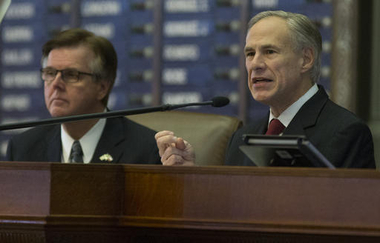Things to know about Texas governor's new agenda

AUSTIN, Texas (AP) — Texas Gov. Greg Abbott called for a punishing so-called "sanctuary cities" while laying out a new agenda in his second State of the State address on Tuesday. Beyond cracking down on local governments that don't fully cooperate with federal immigration agents, here are other highlights from his speech:
___
FIXING 'RICKETY' CHILD WELFARE SYSTEM
Child deaths and backlogs of allegedly neglected children going unchecked by investigators have worsened despite Abbott's efforts to overhaul Texas' troubled child protection agency. Now he's telling lawmakers not to underfund a broken system where traditionally low pay has led to caseworkers resigning in droves.
___
NO MENTION OF NORTH CAROLINA-STYLE "BATHROOM BILL"
Abbott's hour-long speech passed without a call for transgender people to use bathrooms corresponding to their sex at birth. It was another sign that a top priority of Lt. Gov. Dan Patrick is struggling for momentum beyond the Senate as business leaders predict economic backlash if Texas adopts laws that LGBT advocates call discriminatory.
____
STILL SAVING FOR A RAINY DAY
The oil bust left Texas lawmakers billions of dollars short and confronting budget cuts. But Abbott is already rejecting talk of tapping into the $11 billion in the state's Rainy Day Fund to cover the gaps and ordered a hiring freeze through August at most state agencies as a way to curb costs.
___
BACKING SCHOOL VOUCHERS
Abbott has grown more vocal in supporting school vouchers that gives public money to families who remove their children from public schools and send them to private and religious alternatives. But he stopped short of making vouchers a priority and the House has long resisted a push that Democrats and rural Republicans say would hurt public schools.
___
ANOTHER CRACK AT ETHICS REFORM
Abbott didn't get the sweeping ethics reforms he declared a priority in 2015 after the House and Senate clashed over disclosing donors for politically active nonprofits. Two years later, an ethics package in the Senate would put new restrictions on revolving-door lobbying and demand more disclosure by lobbyists who spend money to wine and dine lawmakers. But it keeps the status quo on so-called "dark money."
_
Copyright 2017 The Gayly - 1/31/2017 @ 5:19 p.m. CDT





